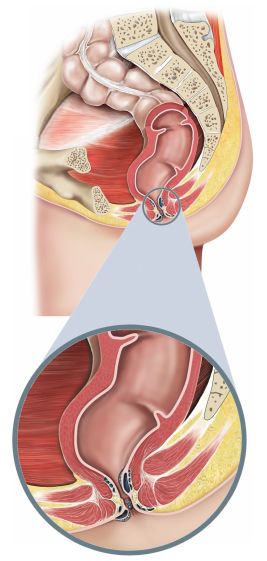What are haemorrhoids?
Haemorrhoids, also known as piles, are soft fleshy lumps just inside your back passage (anus). They bleed easily when you have had a bowel movement. They do not usually cause pain but can cause itching. When large, they can pass through your anus (prolapsed pile), feeling like a lump when you clean yourself (see figure 1).
Haemorrhoids develop gradually, often over a long period of time. They are associated with constipation, often run in families and can be made worse by pregnancy.
What are the benefits of injecting or banding the haemorrhoids?
The procedures shrink the haemorrhoids. You should no longer have any of the symptoms that haemorrhoids can cause.
Are there any alternatives to injecting or banding the haemorrhoids?
Haemorrhoids can often be treated by simple measures, such as drinking plenty of fluid and increasing the amount of fibre in your diet.Only when your surgeon has tried these simple measures, as well as injecting or banding, will they recommend surgery (haemorrhoidectomy).
What does the procedure involve?
Your surgeon will examine carefully your back passage and lower bowel using a flexible or rigid telescope.
Injection - Your surgeon will inject a small amount of a chemical, called phenol, into the lining of your back passage above the haemorrhoid. This should block the blood vessel that supplies the haemorrhoid, causing it to shrink.
Banding - Your surgeon will pass a device through the telescope and place a silicone band onto the lining of your anal canal. The band should block the blood supply to the haemorrhoid, causing it to shrink back up your anal canal.
What complications can happen?
1. General complications
- Pain
- Infection
2. Injection complications
- For men, discomfort and blood in the urine when passing urine
3. Banding complications
- Bleeding
- Feeling faint or light-headed
How soon will I recover?
After the procedure you should be able to go home. You should be able to return to work the next day unless you are told otherwise. Haemorrhoids can come back. You can reduce this risk by drinking plenty of fluid and increasing the amount of fibre in your diet.
Regular exercise should improve your long-term health. Before you start exercising, ask the healthcare team or your GP for advice.
Summary
Injection or banding is usually a safe and effective way of treating haemorrhoids.
Acknowledgments
Author: Mr Jonathan Lund DM FRCS (Gen. Surg.), Illustrations: Medical Illustration Copyright © Medical-Artist.com
This document is intended for information purposes only and should not replace advice that your relevant health professional would give you.
